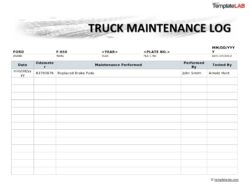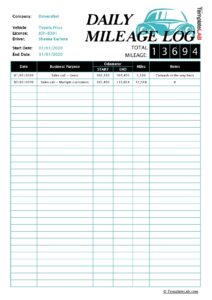Life on the open road as a truck driver is a unique blend of freedom and responsibility. Every day brings new miles, new sights, and new challenges, but also a strict set of rules and regulations that govern your hours. Keeping track of your time on duty, driving, and resting isn’t just a good habit; it’s a crucial part of your profession, ensuring both your safety and your compliance with federal mandates.
Navigating these regulations, especially the complex Hours of Service rules, can feel like a full-time job in itself. That’s where a well-designed daily log comes into play. It simplifies the process, making it easier to record your activities accurately and efficiently. Finding the right system can make all the difference, helping you stay organized and avoid potential pitfalls.
Why Every Truck Driver Needs a Reliable Daily Log Template
For truck drivers, a daily log isn’t just a suggestion; it’s a legal cornerstone of the industry. The Federal Motor Carrier Safety Administration (FMCSA) and state Department of Transportation (DOT) agencies require meticulous records of a driver’s hours to ensure safety on our roads. Failing to maintain accurate logs can lead to hefty fines, out-of-service orders, and even jeopardize your Commercial Driver’s License (CDL). Imagine facing an audit or a roadside inspection without clear, consistent documentation of your last several days. It’s a stressful scenario easily avoided with a proper system in place.
Beyond compliance, a daily log template serves as an invaluable personal tool. It helps with trip planning, allowing you to accurately estimate your remaining drive time and plan your stops effectively. It also acts as a robust record of your activities, which can be critical in situations like disputing a ticket, verifying actual work hours for payroll, or even providing evidence in the event of an accident. It’s your personal diary of the road, offering a snapshot of your daily routine and an indisputable account of your whereabouts and tasks.
Key Components of an Effective Truck Driver Daily Log Template
A truly effective template should be comprehensive yet straightforward, capturing all necessary information without becoming cumbersome. It’s designed to guide you through the data entry process, ensuring you don’t miss any critical details that an inspector might look for. While the specifics can vary slightly, certain core elements are non-negotiable for a compliant and useful daily log.
Here are the essential components you should expect to find:
* Driver’s Full Name and CDL Number
* Date of the Log
* Truck and Trailer Number(s)
* Total Miles Driven for the Day
* Home Terminal Address
* Start Time of Your Shift
* Detailed entries for each change of duty status (e.g., Driving, On-Duty Not Driving, Off-Duty, Sleeper Berth) with corresponding times and locations (city and state)
* Total Hours in Each Duty Status
* Remarks section for any specific notes, fuel stops, delays, or personal conveyance usage
* Driver’s Signature
These components collectively create a complete picture of your workday. Each piece of information plays a role in verifying your compliance with hours of service rules and provides a clear, auditable trail. A well-structured truck driver daily log template ensures that when you’re asked about your time, all the answers are right there, neatly organized and easy to access. It takes the guesswork out of record-keeping, allowing you to focus more on the road ahead.
Choosing the Right Daily Log Template for Your Driving Style
The world of truck driving is diverse, and so are the needs of its drivers. Just as every rig is unique, the ideal daily log template might vary from one driver to the next. What works perfectly for a long-haul driver might not be the best fit for someone making local deliveries, or a driver who frequently crosses state lines. The key is finding a system that seamlessly integrates into your daily routine without adding extra stress.
While many drivers have transitioned to Electronic Logging Devices (ELDs) as mandated, there are still situations where a physical or digital template can be incredibly useful. For instance, as a backup in case of ELD malfunction, for personal conveyance tracking outside of ELD requirements, or for drivers operating under specific exemptions that don’t require an ELD. Paper logs offer a tangible record, while digital templates (like spreadsheets) provide flexibility for easy input and sometimes even automated calculations.
Consider how you prefer to manage information. Are you someone who likes to write things down manually, finding a pen and paper more reliable and immediate? Or do you prefer the convenience of typing, perhaps on a tablet or smartphone, where data can be quickly saved and retrieved? The best daily log template will align with your personal preferences and technological comfort level, making the task of logging feel less like a chore and more like a natural part of your workflow.
Ultimately, your choice should prioritize ease of use, accuracy, and compliance. A good truck driver daily log template should be intuitive, legible, and contain all the necessary fields to satisfy regulatory requirements. It should save you time, reduce the potential for errors, and provide a clear, reliable record of your vital driving hours. Taking the time to select or customize a template that truly fits your operations is an investment in your career and your peace of mind.
Staying on top of your daily logs is more than just ticking boxes; it’s about maintaining a clear, professional record of your dedication and adherence to safety. Consistent, accurate entries protect you, your company, and the public by ensuring everyone on the road is operating within safe limits. This commitment to detail reinforces your professionalism and can be a significant advantage in any situation requiring proof of your activities.
Adopting a systematic approach to your daily logging allows you to navigate the complexities of your profession with confidence. Whether you opt for a traditional paper log or a digital solution, making it a regular habit will streamline your record-keeping and eliminate last-minute scrambles. It’s about empowering yourself with organized information, letting you focus on the journey ahead with the assurance that your paperwork is always in order.

